Deck 12: Vector-Valued Functions
Question
Question
Question
Question
Question
Question
Question
Question
Question
Question
Question
Question
Question
Question
Question
Question
Question
Question
Question
Question
Question
Question
Question
Question
Question
Question
Question
Question
Question
Question
Question
Question
Question
Question
Question
Question
Question
Question
Question
Question
Question
Question
Question
Question
Question
Question
Question
Question
Question
Question
Question
Question
Question
Question
Question
Question
Question
Question
Question
Question
Question
Question
Question
Question
Question
Question
Question
Question
Question
Question
Question
Question
Question
Question
Question
Question
Question
Question
Question
Question

Unlock Deck
Sign up to unlock the cards in this deck!
Unlock Deck
Unlock Deck
1/85
Play
Full screen (f)
Deck 12: Vector-Valued Functions
1
A particle moves in the yz-plane along the curve represented by the vector-valued function  . Find the maximum value of
. Find the maximum value of  .
.
A) 8
B) 6
C) 9
D) 7
E) 3
 . Find the maximum value of
. Find the maximum value of  .
.A) 8
B) 6
C) 9
D) 7
E) 3
C
2
Find the indefinite integral below.  Do not include an arbitrary constant vector.
Do not include an arbitrary constant vector.
A)
B)
C)
D)
E)
 Do not include an arbitrary constant vector.
Do not include an arbitrary constant vector.A)

B)

C)

D)

E)

D
3
Find  at time
at time  for the plane curve
for the plane curve  . Round your answer to three decimal places.
. Round your answer to three decimal places.
A) -30.406
B) -29.533
C) -81.262
D) -35.346
E) -33.994
 at time
at time  for the plane curve
for the plane curve  . Round your answer to three decimal places.
. Round your answer to three decimal places.A) -30.406
B) -29.533
C) -81.262
D) -35.346
E) -33.994
D
4
The graph below is most likely the graph of which of the following equations? 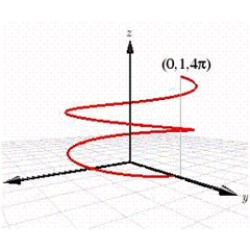
A)
B)
C)
D)
E)

A)

B)

C)

D)

E)


Unlock Deck
Unlock for access to all 85 flashcards in this deck.
Unlock Deck
k this deck
5
Find the curvature of the plane curve  at
at  . Round your answer to three decimal places.
. Round your answer to three decimal places.
A) 0.986
B) 0.658
C) 0.114
D) 0.036
E) 0.027
 at
at  . Round your answer to three decimal places.
. Round your answer to three decimal places.A) 0.986
B) 0.658
C) 0.114
D) 0.036
E) 0.027

Unlock Deck
Unlock for access to all 85 flashcards in this deck.
Unlock Deck
k this deck
6
Find the curvature K of the curve  at the point
at the point  . Round your answer to three decimal places.
. Round your answer to three decimal places.
A) 1.400
B) 1.599
C) 0.192
D) 0.435
E) 0.053
 at the point
at the point  . Round your answer to three decimal places.
. Round your answer to three decimal places.A) 1.400
B) 1.599
C) 0.192
D) 0.435
E) 0.053

Unlock Deck
Unlock for access to all 85 flashcards in this deck.
Unlock Deck
k this deck
7
Find the curvature  of the curve given below.
of the curve given below. 
A)
B)
C)
D)
E)
 of the curve given below.
of the curve given below. 
A)

B)

C)

D)

E)


Unlock Deck
Unlock for access to all 85 flashcards in this deck.
Unlock Deck
k this deck
8
The position vector  describes the path of an object moving in space. Find the velocity
describes the path of an object moving in space. Find the velocity  of the object.
of the object.
A)
B)
C)
D)
E)
 describes the path of an object moving in space. Find the velocity
describes the path of an object moving in space. Find the velocity  of the object.
of the object.A)

B)

C)

D)

E)


Unlock Deck
Unlock for access to all 85 flashcards in this deck.
Unlock Deck
k this deck
9
Evaluate the limit given below. 
A)
B)
C)
D)
E) The limit does not exist.

A)

B)

C)

D)

E) The limit does not exist.

Unlock Deck
Unlock for access to all 85 flashcards in this deck.
Unlock Deck
k this deck
10
Find the open interval on which the curve given by the vector-valued function  is smooth.
is smooth.
A)
B)
C)
D)
E)
 is smooth.
is smooth.A)

B)

C)

D)

E)


Unlock Deck
Unlock for access to all 85 flashcards in this deck.
Unlock Deck
k this deck
11
A baseball is hit 5 feet above the ground at 160 feet per second and at an angle of  with respect to the ground. Find the maximum height. Round your answer to the nearest integer.
with respect to the ground. Find the maximum height. Round your answer to the nearest integer.
A) 247 feet
B) 235 feet
C) 205 feet
D) 218 feet
E) 220 feet
 with respect to the ground. Find the maximum height. Round your answer to the nearest integer.
with respect to the ground. Find the maximum height. Round your answer to the nearest integer.A) 247 feet
B) 235 feet
C) 205 feet
D) 218 feet
E) 220 feet

Unlock Deck
Unlock for access to all 85 flashcards in this deck.
Unlock Deck
k this deck
12
Find the unit tangent vector  for the line tangent to the space curve
for the line tangent to the space curve  at point
at point  .
.
A)
B)
C)
D)
E)
 for the line tangent to the space curve
for the line tangent to the space curve  at point
at point  .
.A)

B)

C)

D)

E)


Unlock Deck
Unlock for access to all 85 flashcards in this deck.
Unlock Deck
k this deck
13
The position vector  describes the path of an object moving in space. Find the speed
describes the path of an object moving in space. Find the speed  of the object.
of the object.
A) 17
B)
C)
D) 115
E)
 describes the path of an object moving in space. Find the speed
describes the path of an object moving in space. Find the speed  of the object.
of the object.A) 17
B)

C)

D) 115
E)


Unlock Deck
Unlock for access to all 85 flashcards in this deck.
Unlock Deck
k this deck
14
Find the point on the curve  at which the curvature K is a maximum.
at which the curvature K is a maximum.
A)
B)
C)
D)
E)
 at which the curvature K is a maximum.
at which the curvature K is a maximum.A)

B)

C)

D)

E)


Unlock Deck
Unlock for access to all 85 flashcards in this deck.
Unlock Deck
k this deck
15
Sketch the curve represented by the vector-valued function  and give the orientation of the curve.
and give the orientation of the curve.
A)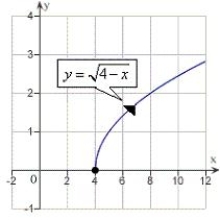
B)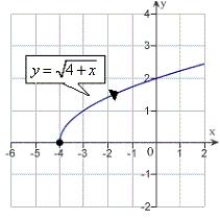
C)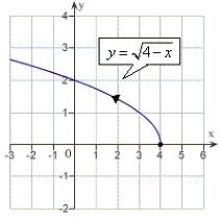
D)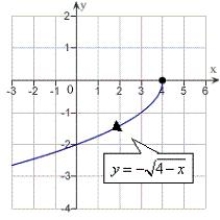
E)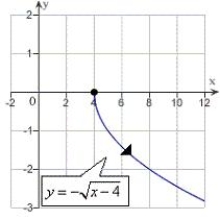
 and give the orientation of the curve.
and give the orientation of the curve.A)

B)

C)

D)

E)


Unlock Deck
Unlock for access to all 85 flashcards in this deck.
Unlock Deck
k this deck
16
Match the equation with the graph shown in red below. 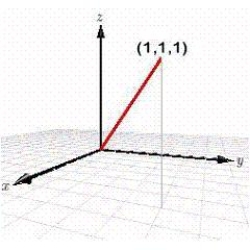
A)
B)
C)
D)
E)

A)

B)

C)

D)

E)


Unlock Deck
Unlock for access to all 85 flashcards in this deck.
Unlock Deck
k this deck
17
Find  at time
at time  for the plane curve
for the plane curve  . Round your answer to three decimal places.
. Round your answer to three decimal places.
A) 5.315
B) 3.010
C) 7.491
D) 3.745
E) 2.657
 at time
at time  for the plane curve
for the plane curve  . Round your answer to three decimal places.
. Round your answer to three decimal places.A) 5.315
B) 3.010
C) 7.491
D) 3.745
E) 2.657

Unlock Deck
Unlock for access to all 85 flashcards in this deck.
Unlock Deck
k this deck
18
The position vector  describes the path of an object moving in the xy-plane. Sketch a graph of the path and sketch the velocity and acceleration vectors at the point
describes the path of an object moving in the xy-plane. Sketch a graph of the path and sketch the velocity and acceleration vectors at the point  .
.
A)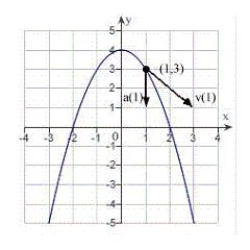
B)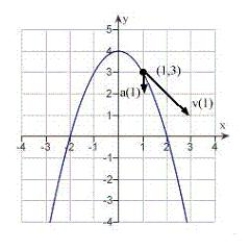
C)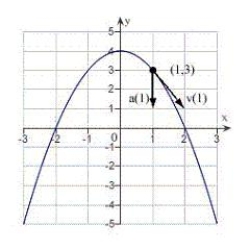
D)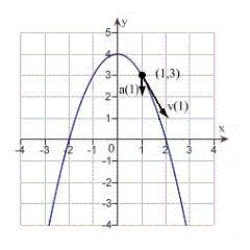
E)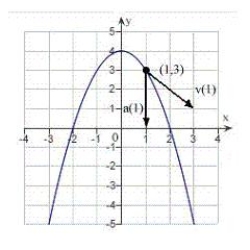
 describes the path of an object moving in the xy-plane. Sketch a graph of the path and sketch the velocity and acceleration vectors at the point
describes the path of an object moving in the xy-plane. Sketch a graph of the path and sketch the velocity and acceleration vectors at the point  .
.A)

B)

C)

D)

E)


Unlock Deck
Unlock for access to all 85 flashcards in this deck.
Unlock Deck
k this deck
19
Determine the maximum height of a projectile fired at a height of 5 feet above the ground with an initial velocity of 600 feet per second and at an angle of  above the horizontal. Use the model for projectile motion, assuming there is no air resistance. Round your answer to three decimal places.
above the horizontal. Use the model for projectile motion, assuming there is no air resistance. Round your answer to three decimal places.
A) 8,440.000 feet
B) 8,442.500 feet
C) 4,221.250 feet
D) 4,223.750 feet
E) 8,447.500 feet
 above the horizontal. Use the model for projectile motion, assuming there is no air resistance. Round your answer to three decimal places.
above the horizontal. Use the model for projectile motion, assuming there is no air resistance. Round your answer to three decimal places.A) 8,440.000 feet
B) 8,442.500 feet
C) 4,221.250 feet
D) 4,223.750 feet
E) 8,447.500 feet

Unlock Deck
Unlock for access to all 85 flashcards in this deck.
Unlock Deck
k this deck
20
Find the length of the plane curve given below. 
A) 14
B) 8
C) 11
D) 13
E) 12

A) 14
B) 8
C) 11
D) 13
E) 12

Unlock Deck
Unlock for access to all 85 flashcards in this deck.
Unlock Deck
k this deck
21
Find a vector-valued function, using the given parameter, to represent the intersection of the surfaces given below. Surfaces
Parameter

A)
B)
C)
D)
E)
Parameter


A)

B)

C)

D)

E)


Unlock Deck
Unlock for access to all 85 flashcards in this deck.
Unlock Deck
k this deck
22
Suppose the two particles travel along the space curves  and
and  . A collision will occur at the point of intersection P if both particles are at P at the same time. Find the point of collision.
. A collision will occur at the point of intersection P if both particles are at P at the same time. Find the point of collision.
A)
B)
C)
D)
E)
 and
and  . A collision will occur at the point of intersection P if both particles are at P at the same time. Find the point of collision.
. A collision will occur at the point of intersection P if both particles are at P at the same time. Find the point of collision.A)

B)

C)

D)

E)


Unlock Deck
Unlock for access to all 85 flashcards in this deck.
Unlock Deck
k this deck
23
Use the properties of the derivative to find  given the following vector-valued functions.
given the following vector-valued functions. 

A) 1
B)
C)
D) 6
E) 0
 given the following vector-valued functions.
given the following vector-valued functions. 

A) 1
B)

C)

D) 6
E) 0

Unlock Deck
Unlock for access to all 85 flashcards in this deck.
Unlock Deck
k this deck
24
Find the point on the curve given below at which the curvature K is zero. 
A)
B)
C)
D)
E)

A)

B)

C)

D)

E)


Unlock Deck
Unlock for access to all 85 flashcards in this deck.
Unlock Deck
k this deck
25
Represent the following curve by a vector-valued function. 
A)
B)
C)
D)
E)

A)

B)

C)

D)

E)


Unlock Deck
Unlock for access to all 85 flashcards in this deck.
Unlock Deck
k this deck
26
Find the principle unit normal vector to the curve given below at the specified point. 
A)
B)
C)
D)
E)

A)

B)

C)

D)

E)


Unlock Deck
Unlock for access to all 85 flashcards in this deck.
Unlock Deck
k this deck
27
A baseball is hit 5 feet above the ground at 80 feet per second and at an angle of  with respect to the ground. Find the arc length of the trajectory. Round your answer to one decimal place.
with respect to the ground. Find the arc length of the trajectory. Round your answer to one decimal place.
A) 194.2 feet
B) 212.3 feet
C) 210.1 feet
D) 171.4 feet
E) 236.5 feet
 with respect to the ground. Find the arc length of the trajectory. Round your answer to one decimal place.
with respect to the ground. Find the arc length of the trajectory. Round your answer to one decimal place. A) 194.2 feet
B) 212.3 feet
C) 210.1 feet
D) 171.4 feet
E) 236.5 feet

Unlock Deck
Unlock for access to all 85 flashcards in this deck.
Unlock Deck
k this deck
28
Find the principle unit normal vector to the curve given below at the specified point. 
A)
B)
C)
D)
E)

A)

B)

C)

D)

E)


Unlock Deck
Unlock for access to all 85 flashcards in this deck.
Unlock Deck
k this deck
29
The quarterback of a football team releases a pass at a height of 6 feet above the playing field, and the football is caught by a receiver 78 yards directly downfield at a height of 4 feet. The pass is released at an angle of  with the horizontal. Find the time in seconds the receiver has to reach the proper position after the quarterback releases the football. Round your answer to one decimal place.
with the horizontal. Find the time in seconds the receiver has to reach the proper position after the quarterback releases the football. Round your answer to one decimal place.
A) 2.2 seconds
B) 12.8 seconds
C) 22.2 seconds
D) 3.7 seconds
E) 7.4 seconds
 with the horizontal. Find the time in seconds the receiver has to reach the proper position after the quarterback releases the football. Round your answer to one decimal place.
with the horizontal. Find the time in seconds the receiver has to reach the proper position after the quarterback releases the football. Round your answer to one decimal place.A) 2.2 seconds
B) 12.8 seconds
C) 22.2 seconds
D) 3.7 seconds
E) 7.4 seconds

Unlock Deck
Unlock for access to all 85 flashcards in this deck.
Unlock Deck
k this deck
30
Find the domain of the vector-valued function given below.  where
where 

A)
B)
C)
D)
E)
 where
where 

A)

B)

C)

D)

E)


Unlock Deck
Unlock for access to all 85 flashcards in this deck.
Unlock Deck
k this deck
31
Find the vectors  and
and  for the following vector function.
for the following vector function. 
A)
B)
C)
D)
E)
 and
and  for the following vector function.
for the following vector function. 
A)

B)

C)

D)

E)


Unlock Deck
Unlock for access to all 85 flashcards in this deck.
Unlock Deck
k this deck
32
Find the indefinite integral below.  Do not include an arbitrary constant vector.
Do not include an arbitrary constant vector.
A)
B)
C)
D)
E)
 Do not include an arbitrary constant vector.
Do not include an arbitrary constant vector.A)

B)

C)

D)

E)


Unlock Deck
Unlock for access to all 85 flashcards in this deck.
Unlock Deck
k this deck
33
Find the length of the space curve given below. 
A)
B)
C)
D)
E)

A)

B)

C)

D)

E)


Unlock Deck
Unlock for access to all 85 flashcards in this deck.
Unlock Deck
k this deck
34
Use the properties of the derivative to find  given the following vector-valued functions.
given the following vector-valued functions. 

A)
B)
C)
D)
E)
 given the following vector-valued functions.
given the following vector-valued functions. 

A)

B)

C)

D)

E)


Unlock Deck
Unlock for access to all 85 flashcards in this deck.
Unlock Deck
k this deck
35
Use the properties of the derivative to find  given the following vector-valued functions.
given the following vector-valued functions. 
A)
B)
C)
D)
E)
 given the following vector-valued functions.
given the following vector-valued functions. 
A)

B)

C)

D)

E)


Unlock Deck
Unlock for access to all 85 flashcards in this deck.
Unlock Deck
k this deck
36
Determine the range of a projectile fired at a height of 3 feet above the ground with an initial velocity of 500 feet per second and at an angle of  above the horizontal. Use the model for projectile motion, assuming there is no air resistance. Round your answer to three decimal places.
above the horizontal. Use the model for projectile motion, assuming there is no air resistance. Round your answer to three decimal places.
A) 2,669.517 feet
B) 1,764.116 feet
C) 5,337.349 feet
D) 6,767.555 feet
E) 3,525.690 feet
 above the horizontal. Use the model for projectile motion, assuming there is no air resistance. Round your answer to three decimal places.
above the horizontal. Use the model for projectile motion, assuming there is no air resistance. Round your answer to three decimal places.A) 2,669.517 feet
B) 1,764.116 feet
C) 5,337.349 feet
D) 6,767.555 feet
E) 3,525.690 feet

Unlock Deck
Unlock for access to all 85 flashcards in this deck.
Unlock Deck
k this deck
37
Suppose the outer edge of a playground slide is in the shape of a helix of radius 8 meters. The slide has a height of 2 meters and makes one complete revolution from top to bottom. Find a vector-valued function for the helix.
A)
B)
C)
D)
E)
A)

B)

C)

D)

E)


Unlock Deck
Unlock for access to all 85 flashcards in this deck.
Unlock Deck
k this deck
38
A 5800-pound vehicle is driven at a speed of 25 miles per hour on a circular interchange of radius 90 feet. To keep the vehicle from skidding off course, what frictional force must the road surface exert on the tires? Round your answer to one decimal place.
A) 2,716.9 lb
B) 3,396.4 lb
C) 3,046.0 lb
D) 2,707.6 lb
E) 3,565.1 lb
A) 2,716.9 lb
B) 3,396.4 lb
C) 3,046.0 lb
D) 2,707.6 lb
E) 3,565.1 lb

Unlock Deck
Unlock for access to all 85 flashcards in this deck.
Unlock Deck
k this deck
39
Sketch the curve represented by the vector-valued function  and give the orientation of the curve.
and give the orientation of the curve.
A)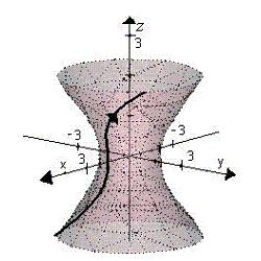
B)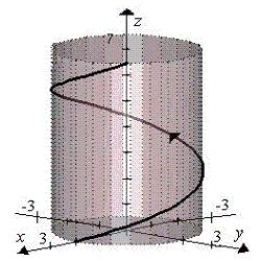
C)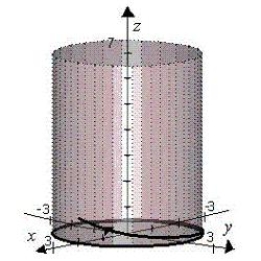
D)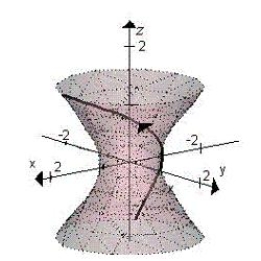
E)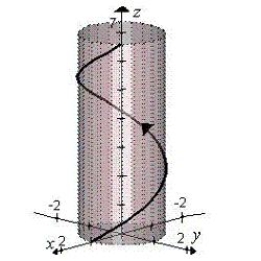
 and give the orientation of the curve.
and give the orientation of the curve.A)

B)

C)

D)

E)


Unlock Deck
Unlock for access to all 85 flashcards in this deck.
Unlock Deck
k this deck
40
Find the unit tangent vector to the curve given below at the specified point. 
A)
B)
C)
D)
E)

A)

B)

C)

D)

E)


Unlock Deck
Unlock for access to all 85 flashcards in this deck.
Unlock Deck
k this deck
41
Find the domain of the vector-valued function given below. 
A)
B)
C)
D)
E)

A)

B)

C)

D)

E)


Unlock Deck
Unlock for access to all 85 flashcards in this deck.
Unlock Deck
k this deck
42
A particle moves in the yz-plane along the curve represented by the vector-valued function  . Find the minimum value of
. Find the minimum value of  .
.
A) 3
B) 2
C) 5
D) 6
E) 8
 . Find the minimum value of
. Find the minimum value of  .
.A) 3
B) 2
C) 5
D) 6
E) 8

Unlock Deck
Unlock for access to all 85 flashcards in this deck.
Unlock Deck
k this deck
43
Find a vector-valued function, using the given parameter, to represent the intersection of the surfaces given below. Surfaces
Parameter

A)
B)
C)
D)
E)
Parameter


A)

B)

C)

D)

E)


Unlock Deck
Unlock for access to all 85 flashcards in this deck.
Unlock Deck
k this deck
44
Find  given the following vector function.
given the following vector function. 
A) 1
B) -18
C) 18
D) 0
E) 3
 given the following vector function.
given the following vector function. 
A) 1
B) -18

C) 18

D) 0
E) 3


Unlock Deck
Unlock for access to all 85 flashcards in this deck.
Unlock Deck
k this deck
45
Find  at time
at time  for the space curve
for the space curve  . Round your answer to three decimal places.
. Round your answer to three decimal places.
A) 0.816
B) 0.389
C) 0.777
D) 1.864
E) 0.889
 at time
at time  for the space curve
for the space curve  . Round your answer to three decimal places.
. Round your answer to three decimal places.A) 0.816
B) 0.389
C) 0.777
D) 1.864
E) 0.889

Unlock Deck
Unlock for access to all 85 flashcards in this deck.
Unlock Deck
k this deck
46
Find  given the following vector function:
given the following vector function: 
A)
B) 0
C)
D)
E)
 given the following vector function:
given the following vector function: 
A)

B) 0
C)

D)

E)


Unlock Deck
Unlock for access to all 85 flashcards in this deck.
Unlock Deck
k this deck
47
Find  at time
at time  for the space curve
for the space curve  . Round your answer to three decimal places.
. Round your answer to three decimal places.
A) 1.069
B) 0.963
C) 0.468
D) 0.936
E) 0.848
 at time
at time  for the space curve
for the space curve  . Round your answer to three decimal places.
. Round your answer to three decimal places.A) 1.069
B) 0.963
C) 0.468
D) 0.936
E) 0.848

Unlock Deck
Unlock for access to all 85 flashcards in this deck.
Unlock Deck
k this deck
48
Given the vector-valued function below, evaluate  .
. 
A)
B)
C)
D)
E)
 .
. 
A)

B)

C)

D)

E)


Unlock Deck
Unlock for access to all 85 flashcards in this deck.
Unlock Deck
k this deck
49
The position vector  describes the path of an object moving in space. Find the velocity
describes the path of an object moving in space. Find the velocity  of the object.
of the object.
A)
B)
C)
D)
E)
 describes the path of an object moving in space. Find the velocity
describes the path of an object moving in space. Find the velocity  of the object.
of the object.A)

B)

C)

D)

E)


Unlock Deck
Unlock for access to all 85 flashcards in this deck.
Unlock Deck
k this deck
50
Evaluate the limit given below. 
A)
B)
C)
D)
E) The limit does not exist.

A)

B)

C)

D)

E) The limit does not exist.

Unlock Deck
Unlock for access to all 85 flashcards in this deck.
Unlock Deck
k this deck
51
Find  at time
at time  for the plane curve
for the plane curve  . Round your answer to three decimal places.
. Round your answer to three decimal places.
A) 28.451
B) 28.636
C) 28.400
D) 28.111
E) 20.897
 at time
at time  for the plane curve
for the plane curve  . Round your answer to three decimal places.
. Round your answer to three decimal places.A) 28.451
B) 28.636
C) 28.400
D) 28.111
E) 20.897

Unlock Deck
Unlock for access to all 85 flashcards in this deck.
Unlock Deck
k this deck
52
The smaller the curvature in a bend of a road, the faster a car can travel. Assume that the maximum speed around a turn is inversely proportional to the square root of the curvature. A car moving on the path  (x and y are measured in miles) can safely go 30 miles per hour at
(x and y are measured in miles) can safely go 30 miles per hour at  . How fast can it go at
. How fast can it go at  ? Round your answer to two decimal places.
? Round your answer to two decimal places.
A) mi/h
mi/h
B) mi/h
mi/h
C) mi/h
mi/h
D) mi/h
mi/h
E) mi/h
mi/h
 (x and y are measured in miles) can safely go 30 miles per hour at
(x and y are measured in miles) can safely go 30 miles per hour at  . How fast can it go at
. How fast can it go at  ? Round your answer to two decimal places.
? Round your answer to two decimal places.A)
 mi/h
mi/hB)
 mi/h
mi/hC)
 mi/h
mi/hD)
 mi/h
mi/hE)
 mi/h
mi/h
Unlock Deck
Unlock for access to all 85 flashcards in this deck.
Unlock Deck
k this deck
53
Find  at time
at time  for the space curve
for the space curve  .
.
A) 9
B) 0
C) 8
D) 64
E) 3
 at time
at time  for the space curve
for the space curve  .
.A) 9
B) 0
C) 8
D) 64
E) 3

Unlock Deck
Unlock for access to all 85 flashcards in this deck.
Unlock Deck
k this deck
54
Use the properties of the derivative to find  given the following vector-valued functions.
given the following vector-valued functions. 

A)
B)
C)
D)
E)
 given the following vector-valued functions.
given the following vector-valued functions. 

A)

B)

C)

D)

E)


Unlock Deck
Unlock for access to all 85 flashcards in this deck.
Unlock Deck
k this deck
55
The quarterback of a football team releases a pass at a height of 6 feet above the playing field, and the football is caught by a receiver 30 yards directly downfield at a height of 5 feet. The pass is released at an angle of  with the horizontal. Find the speed of the football when it is released. Round your answer to three decimal places.
with the horizontal. Find the speed of the football when it is released. Round your answer to three decimal places.
A) 32.979 feet per second
B) 57.483 feet per second
C) 18.863 feet per second
D) 114.967 feet per second
E) 189.144 feet per second
 with the horizontal. Find the speed of the football when it is released. Round your answer to three decimal places.
with the horizontal. Find the speed of the football when it is released. Round your answer to three decimal places.A) 32.979 feet per second
B) 57.483 feet per second
C) 18.863 feet per second
D) 114.967 feet per second
E) 189.144 feet per second

Unlock Deck
Unlock for access to all 85 flashcards in this deck.
Unlock Deck
k this deck
56
Use the properties of the derivative to find  given the following vector-valued functions.
given the following vector-valued functions. 

A)
B)
C)
D)
E)
 given the following vector-valued functions.
given the following vector-valued functions. 

A)

B)

C)

D)

E)


Unlock Deck
Unlock for access to all 85 flashcards in this deck.
Unlock Deck
k this deck
57
Find  at time
at time  for the plane curve
for the plane curve  . Round your answer to three decimal places.
. Round your answer to three decimal places.
A) 4.575
B) 3.841
C) 2.716
D) 1.718
E) 4.685
 at time
at time  for the plane curve
for the plane curve  . Round your answer to three decimal places.
. Round your answer to three decimal places.A) 4.575
B) 3.841
C) 2.716
D) 1.718
E) 4.685

Unlock Deck
Unlock for access to all 85 flashcards in this deck.
Unlock Deck
k this deck
58
A baseball is hit 5 feet above the ground at 160 feet per second and at an angle of  with respect to the ground. Find the vector-valued function for the path of the baseball.
with respect to the ground. Find the vector-valued function for the path of the baseball.
A)
B)
C)
D)
E)
 with respect to the ground. Find the vector-valued function for the path of the baseball.
with respect to the ground. Find the vector-valued function for the path of the baseball.A)

B)

C)

D)

E)


Unlock Deck
Unlock for access to all 85 flashcards in this deck.
Unlock Deck
k this deck
59
Find  at time
at time  for the space curve
for the space curve  . Round your answer to three decimal places.
. Round your answer to three decimal places.
A) 0.041
B) 0.093
C) 0.406
D) 0.000
E) 0.914
 at time
at time  for the space curve
for the space curve  . Round your answer to three decimal places.
. Round your answer to three decimal places.A) 0.041
B) 0.093
C) 0.406
D) 0.000
E) 0.914

Unlock Deck
Unlock for access to all 85 flashcards in this deck.
Unlock Deck
k this deck
60
Determine the interval on which the vector-valued function  is continuous.
is continuous.
A)
B)
C)
D)
E)
 is continuous.
is continuous.A)

B)

C)

D)

E)


Unlock Deck
Unlock for access to all 85 flashcards in this deck.
Unlock Deck
k this deck
61
Use the given acceleration function and initial conditions to find the position at time t = 1. 
A)
B)
C)
D)
E)

A)

B)

C)

D)

E)


Unlock Deck
Unlock for access to all 85 flashcards in this deck.
Unlock Deck
k this deck
62
A baseball, hit 7 feet above the ground, leaves the bat at an angle of  and its caught by an outfielder 7 feet above the ground and 400 feet from home plate. How high does the ball rise? Round your answer to the nearest integer.
and its caught by an outfielder 7 feet above the ground and 400 feet from home plate. How high does the ball rise? Round your answer to the nearest integer.
A) 180 feet
B) 18 feet
C) 397 feet
D) 278 feet
E) 50 feet
 and its caught by an outfielder 7 feet above the ground and 400 feet from home plate. How high does the ball rise? Round your answer to the nearest integer.
and its caught by an outfielder 7 feet above the ground and 400 feet from home plate. How high does the ball rise? Round your answer to the nearest integer. A) 180 feet
B) 18 feet
C) 397 feet
D) 278 feet
E) 50 feet

Unlock Deck
Unlock for access to all 85 flashcards in this deck.
Unlock Deck
k this deck
63
Use the given acceleration function and initial conditions to find the position at time t = 4. 
A)
B)
C)
D)
E)

A)

B)

C)

D)

E)


Unlock Deck
Unlock for access to all 85 flashcards in this deck.
Unlock Deck
k this deck
64
Find the curvature K of the curve  at the point
at the point  . Round your answer to three decimal places.
. Round your answer to three decimal places.
A) 0.728
B) 0.970
C) 0.158
D) 0.057
E) 0.126
 at the point
at the point  . Round your answer to three decimal places.
. Round your answer to three decimal places.A) 0.728
B) 0.970
C) 0.158
D) 0.057
E) 0.126

Unlock Deck
Unlock for access to all 85 flashcards in this deck.
Unlock Deck
k this deck
65
The quarterback of a football team releases a pass at a height of 6 feet above the playing field, and the football is caught by a receiver 62 yards directly downfield at a height of 3 feet. The pass is released at an angle of  with the horizontal. Find the maximum height of the football. Round your answer to one decimal place.
with the horizontal. Find the maximum height of the football. Round your answer to one decimal place.
A) 337.1 feet
B) 16.3 feet
C) 245.4 feet
D) 85.8 feet
E) 17.5 feet
 with the horizontal. Find the maximum height of the football. Round your answer to one decimal place.
with the horizontal. Find the maximum height of the football. Round your answer to one decimal place. A) 337.1 feet
B) 16.3 feet
C) 245.4 feet
D) 85.8 feet
E) 17.5 feet

Unlock Deck
Unlock for access to all 85 flashcards in this deck.
Unlock Deck
k this deck
66
Find  given the following vector function.
given the following vector function. 
A)
B)
C)
D)
E)
 given the following vector function.
given the following vector function. 
A)

B)

C)

D)

E)


Unlock Deck
Unlock for access to all 85 flashcards in this deck.
Unlock Deck
k this deck
67
Find a vector-valued function, using the given parameter, to represent the intersection of the surfaces given below. Surfaces
Parameter

A)
B)
C)
D)
E)
Parameter


A)

B)

C)

D)

E)


Unlock Deck
Unlock for access to all 85 flashcards in this deck.
Unlock Deck
k this deck
68
Find  given the following vector function.
given the following vector function. 
A)
B)
C)
D)
E)
 given the following vector function.
given the following vector function. 
A)

B)

C)

D)

E)


Unlock Deck
Unlock for access to all 85 flashcards in this deck.
Unlock Deck
k this deck
69
Because of a storm, ground controllers instruct the pilot of a plane flying at an altitude of 3.2 miles to make a  turn and climb to an altitude of 3.4 miles. The model for the path of the plane during this maneuver is
turn and climb to an altitude of 3.4 miles. The model for the path of the plane during this maneuver is  where t is the time in hours and r is the distance in miles. Determine the speed of the plane. Round your answer to the nearest integer.
where t is the time in hours and r is the distance in miles. Determine the speed of the plane. Round your answer to the nearest integer.
A) 201 mi/h
B) 64 mi/h
C) 173 mi/h
D) 137 mi/h
E) 255 mi/h
 turn and climb to an altitude of 3.4 miles. The model for the path of the plane during this maneuver is
turn and climb to an altitude of 3.4 miles. The model for the path of the plane during this maneuver is  where t is the time in hours and r is the distance in miles. Determine the speed of the plane. Round your answer to the nearest integer.
where t is the time in hours and r is the distance in miles. Determine the speed of the plane. Round your answer to the nearest integer.A) 201 mi/h
B) 64 mi/h
C) 173 mi/h
D) 137 mi/h
E) 255 mi/h

Unlock Deck
Unlock for access to all 85 flashcards in this deck.
Unlock Deck
k this deck
70
Find the unit tangent vector to the curve given below at the specified point. 
A)
B)
C)
D)
E)

A)

B)

C)

D)

E)


Unlock Deck
Unlock for access to all 85 flashcards in this deck.
Unlock Deck
k this deck
71
Find the arc length for  over the interval
over the interval  . Round your answer to two decimal places.
. Round your answer to two decimal places.
A) 110.36
B) 140.93
C) 129.56
D) 57.80
E) 102.75
 over the interval
over the interval  . Round your answer to two decimal places.
. Round your answer to two decimal places. A) 110.36
B) 140.93
C) 129.56
D) 57.80
E) 102.75

Unlock Deck
Unlock for access to all 85 flashcards in this deck.
Unlock Deck
k this deck
72
The position vector  describes the path of an object moving in space. Find the acceleration
describes the path of an object moving in space. Find the acceleration  of the object.
of the object.
A)
B)
C)
D)
E)
 describes the path of an object moving in space. Find the acceleration
describes the path of an object moving in space. Find the acceleration  of the object.
of the object.A)

B)

C)

D)

E)


Unlock Deck
Unlock for access to all 85 flashcards in this deck.
Unlock Deck
k this deck
73
Find the principle unit normal vector to the curve given below at the specified point. 
A)
B)
C)
D)
E)

A)

B)

C)

D)

E)


Unlock Deck
Unlock for access to all 85 flashcards in this deck.
Unlock Deck
k this deck
74
Find a vector-valued function, using the given parameter, to represent the intersection of the surfaces given below. Surfaces
Parameter

A)
B)
C)
D)
E)
Parameter


A)

B)

C)

D)

E)


Unlock Deck
Unlock for access to all 85 flashcards in this deck.
Unlock Deck
k this deck
75
A baseball is hit 3 feet above the ground at 95 feet per second and at an angle of  with respect to the ground. Find the range. Round your answer to one decimal place.
with respect to the ground. Find the range. Round your answer to one decimal place.
A) 285 feet
B) 352.2 feet
C) 370.7 feet
D) 501.9 feet
E) 300 feet
 with respect to the ground. Find the range. Round your answer to one decimal place.
with respect to the ground. Find the range. Round your answer to one decimal place.A) 285 feet
B) 352.2 feet
C) 370.7 feet
D) 501.9 feet
E) 300 feet

Unlock Deck
Unlock for access to all 85 flashcards in this deck.
Unlock Deck
k this deck
76
Find the radius of curvature of the plane curve  at
at  . Round your answer to three decimal places.
. Round your answer to three decimal places.
A) 1021.045
B) 2340.571
C) 1374.626
D) 1565.001
E) 1571.001
 at
at  . Round your answer to three decimal places.
. Round your answer to three decimal places.A) 1021.045
B) 2340.571
C) 1374.626
D) 1565.001
E) 1571.001

Unlock Deck
Unlock for access to all 85 flashcards in this deck.
Unlock Deck
k this deck
77
The position vector  describes the path of an object moving in space. Find the speed
describes the path of an object moving in space. Find the speed  of the object.
of the object.
A)

B) 122
122
C)

D)

E) 18
18
 describes the path of an object moving in space. Find the speed
describes the path of an object moving in space. Find the speed  of the object.
of the object. A)


B)
 122
122C)


D)


E)
 18
18
Unlock Deck
Unlock for access to all 85 flashcards in this deck.
Unlock Deck
k this deck
78
A baseball player at second base throws a ball 95 feet to the player at first base. The ball is thrown 8 feet above the ground with an initial velocity of 46 miles per hour and at an angle of  above the horizontal. At which height does the player at first base catch the ball? Round your answer to three decimal places.
above the horizontal. At which height does the player at first base catch the ball? Round your answer to three decimal places.
A) 2.908 feet
B) 2.008 feet
C) 0.808 feet
D) 1.408 feet
E) 0.908 feet
 above the horizontal. At which height does the player at first base catch the ball? Round your answer to three decimal places.
above the horizontal. At which height does the player at first base catch the ball? Round your answer to three decimal places.A) 2.908 feet
B) 2.008 feet
C) 0.808 feet
D) 1.408 feet
E) 0.908 feet

Unlock Deck
Unlock for access to all 85 flashcards in this deck.
Unlock Deck
k this deck
79
Evaluate the definite integral below. 
A)
B)
C)
D)
E)

A)

B)

C)

D)

E)


Unlock Deck
Unlock for access to all 85 flashcards in this deck.
Unlock Deck
k this deck
80
Find  given the following vector function.
given the following vector function. 
A)
B)
C)
D)
E)
 given the following vector function.
given the following vector function. 
A)

B)

C)

D)

E)


Unlock Deck
Unlock for access to all 85 flashcards in this deck.
Unlock Deck
k this deck



